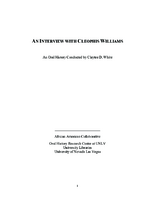Search the Special Collections and Archives Portal
Search Results

Lee Tilman interview, 1996: transcript
Date
Archival Collection
Description
In the interviews, Tilman discusses his birth in Gooding, Idaho in 1913, his early life, and his arrival to Las Vegas, Nevada in 1931. Tilman then talks about his experiences mining, milling, and ranching before moving to Las Vegas. While in Las Vegas, Tilman was involved with construction of Hoover Dam (Boulder Dam) and labor issues. Later, Tilman describes fishing and boating in the Colorado River, working at a duplex mine in Searchlight, Nevada, and working at the Las Vegas Ice House. Lastly, Tilman talks about influential Boulder City residents he knew, his children, and the Stratosphere Hotel and Casino.
Text

Nanyu Tomiyasu interview, April 12, 1977: transcript
Date
Archival Collection
Description
On April 12, 1977, collector Mark French interviewed Nanyu Tomiyasu (born May 28th, 1918 in Las Vegas, Nevada) at the University of Nevada, Las Vegas. In this interview, Nanyu Tomiyasu discusses growing up and working on his father’s (Bill Yonema Tomiyasu) farm in Las Vegas, Nevada. He also discusses how his father came to Las Vegas and being one of the few Japanese families in Las Vegas as a child.
Text

Nanyu Tomiyasu interview, March 11, 1978: transcript
Date
Archival Collection
Description
On March 11, 1978, Sosuke Miyazawa interviewed Nanyu Tomiyasu (b. May 28, 1918 in Las Vegas, Nevada) about his family’s farm and their legacy as one of the pioneering families of the city. Tomiyasu begins by talking about what brought his family to Las Vegas, the city’s abundant water reservoir and his father’s farm. In particular, Tomiyasu discusses his father’s experiments with farming as one of the city’s early farmers, the transition into nursery farming and Japanese gardens. Moreover, he discusses his siblings, the local schools, their great quality, the successful students the city produced and the growth of school populations. Tomiyasu describes the large Japanese population and the Union Pacific Railroad that many of them worked on. He ends by discussing the change in architecture within the city, such as where old buildings stood and what they are used for now, the first Episcopal Church and the old Mormon Fort.
Text

Transcript of interview with Byron Underhill by Joyce Moore, March 20, 2002
Date
Archival Collection
Description
Byron Underhill's father owned the first Coca-Cola bottling plant, the first beer distributorship, and the first bowling alley in Las Vegas. Byron moved here from Needles, Calif., with his family in 1927. Byron later took over the bottling plant, served in the Army as an aircraft mechanic and a glider pilot during World War II, was a private pilot who worked with Search and Rescue, played in various bands, and suggested to the Lions club that they found a burn unit at University Medical Center that is still the only one in the state
Text

Transcript of interview with Roscoe Wilkes by Claytee White, March 19, 2009
Date
Archival Collection
Description
Roscoe Wilkes was born in Bonanza, Colorado, and moved with his family to Pioche, Nevada for what his sister called a 75-year pit stop. Soon after their move to this rural Nevada town, Roscoe’s mother became a widow, raising two children during the Depression. Like many families in Pioche, the Wilkes’ made due with what they had, and were creative in sustaining their livelihoods. Roscoe has never stood still. Before enlisting in the military, Roscoe worked various jobs, as a PBX systems operator, a lead zinc miner, and grade school teacher, before enlisting. During World War II, Roscoe became a prisoner of war in Romania, and was rescued a few months later when the Germans began retreating. Returning to the United States after his release, he relocated to a base in California, and married. As soon as Roscoe was relieved of his military service, he took advantage of the then new G.I. Bill and enrolled in the University of Southern California School of Law. He immediately took his degree to Pioche, soon becoming its district attorney, and later a judge. He spent 18 years based in Seattle as a federal administrative law judge, hearing cases prosecuted by the Coast Guard. Roscoe ended his 45-year career in law in 1990, and moved to Boulder City, where four generations of Wilkes live.
Text

Transcript of interview with Cleophis Williams by Claytee White, April 27, 2010
Date
Archival Collection
Description
In 1943, Cleophis Hill Williams was a teenager visiting her mother who had moved to Las Vegas. For most of her young life she had lived with her parents in Muskogee, Oklahoma and Paul Spur/Douglas, Arizona. The same year that she visited Las Vegas, she met her future husband Tom Williams, with whom she had nine children, all born and raised on the Westside. Tom worked construction and built their first home on G Street. For Cleophis, she focused her life on raising her children and, whenever possible, finding some precious time to read.
Text

Transcript of interview with Bruce Woodbury by Claytee White, February 25, 2009
Date
Archival Collection
Description
When Bruce Woodbury, native Las Vegan, attorney, and former county commissioner, looks back on growing up, he immediately says: My first memory of a house here in Las Vegas was in the John S. Park area. The Woodbuiy family lived in two houses in the neighborhood and attended only two schools, John S. Park Elementaiy and Las Vegas High School. Bruce's recollections begin in the 1940s, when they lived on the edge of town. Bruce has what he calls a "nostalgic yearning for the old Las Vegas, even though today it's an exciting, vibrant community in many ways." And during this oral history interview, he recalls the safe feeling of the times—unlocked doors and children allowed to roam more freely than today. The Strip was a "separate world" where kids like himself might go to a show occasionally with their parents, celebrate a prom dance or, as he did, get a part-time job. One of Bruce's jobs included being a busboy at the Flamingo Hotel & Casino where he confesses to learning and
Text
Clinton Wright oral history interview: audio clip
Date
Archival Collection
Description
Clinton Wright discusses the riots in the predominantly Black Westside neighborhood in Las Vegas in 1992 after the Rodney King verdict. Wright describes how the riots lasted three to four days, and he thought they were instigated by people who came from California and Los Angeles. He said that the shopping center in the Westside burned, there were firebombs, and white drivers were attacked and beaten up while the police did little to control it. Wright was known as a photographer and a newspaper offered him $50 per hour to take pictures of the riots. After some consideration, her turned this offer down because he believed it would be dangerous for him with a camera.
Sound

Transcript of interview with Tom Wright by Claytee White, February 14, 2005
Date
Archival Collection
Description
Dr. Tom Wright was born and grew up in Illinois. His father finished his PhD in Chicago and then taught at Illinois College in Jacksonville. His mother suffered from arthritis and was told to seek a warmer climate, so John Wright packed up his family and moved to Las Vegas. Tom was 14, ready for high school, and his two brothers were elementary school age. Tom attended Las Vegas High School, which was close to the Crestwood community where the family had purchased their first home. He remembers that UNLV had no buildings when his dad first started teaching there. Instead, he conducted class in high school classrooms and church Sunday school rooms. Dr. Wright started off at a community college as a Geology Major, but a class with Bud Poland convinced him that history was his passion. He transferred to Pomona to continue his bachelor's degree. He spent his junior year in Peru on a study-abroad program, and that experience made him a Latin Americanist. The information he gath
Text

Transcript of interview with Christie Young by Dennis McBride, October 18, 1998
Date
Archival Collection
Description
I've known Christie Young for many years and was grateful she agreed to be interviewed for the Las Vegas Gay Archives Oral History Project. Not only is she frank in what she says, but her background as a researcher in sexual issues and as a straight woman involved in the gay community give her a unique perspective. Ancillary to her donation of this interview transcript to the University of Nevada, Las Vegas, Christie has generously donated her personal journals which detail more than a decade of her life including the years she worked with Las Vegas's gay community . Christie shares the project's concern that documentation of the gay community is ephemeral and vanishes rapidly; her determination that her contribution to that community be preserved greatly enriches our knowledge and will benefit future scholars.
Text
